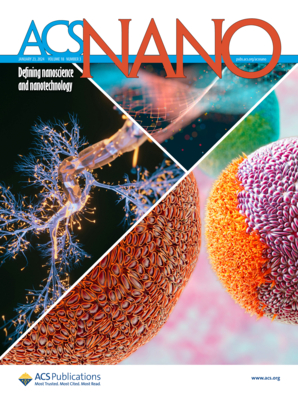Acid-Triggered Charge-Switchable Antibacterial Hydrogel for Accelerated Healing of Gastric Mucosal Wounds
IF 15.8
1区 材料科学
Q1 CHEMISTRY, MULTIDISCIPLINARY
引用次数: 0
Abstract
Infection with Helicobacter pylori (H. pylori) is a primary etiological factor for chronic gastritis, peptic ulcers, and gastric cancer. The limited specificity of antibiotics against H. pylori, combined with the risk of severe adverse events from endoscopic submucosal dissection (ESD), presents a major global health challenge in treating gastric mucosal injuries. To address this issue, we developed a targeted antibacterial hydrogel based on a charge-reversal amphiphilic molecule, designed for the harsh gastric acid environment and capable of immediate and strong adhesion. The hydrogel is composed of acryl aspartate (AASP) and cysteine-grafted carboxymethyl chitosan (CMCS-NAC) as the base matrix, integrated with gastric acid-responsive charge-reversal antibacterial molecules (C16N-DCA). Simulated studies show that C16N-DCA undergoes charge reversal under acidic conditions (pH 3), enabling targeted H. pylori eradication mediated by gastric acid, with 98% efficacy and sustained antibacterial activity for up to 36 h. In vitro and in vivo experiments in rodent and porcine models confirmed its safety and efficacy in acidic gastric conditions. This hydrogel offers strong tissue protection and effectively modulates the gastric wound microenvironment, facilitating wound healing and presenting an easily adoptable solution for gastric wound management.

酸触发电荷转换抗菌水凝胶加速胃粘膜伤口愈合
幽门螺杆菌感染是慢性胃炎、消化性溃疡和胃癌的主要病因。抗生素对幽门螺杆菌的特异性有限,加上内镜下粘膜剥离(ESD)严重不良事件的风险,是治疗胃粘膜损伤的主要全球健康挑战。为了解决这一问题,我们开发了一种基于电荷反转两亲分子的靶向抗菌水凝胶,该水凝胶专为恶劣的胃酸环境而设计,具有即时和强粘附能力。该水凝胶以丙烯天冬氨酸(AASP)和半胱氨酸接枝羧甲基壳聚糖(CMCS-NAC)为基体,与胃酸反应性电荷反转抗菌分子(C16N-DCA)结合而成。模拟研究表明,C16N-DCA在酸性条件下(pH为3)发生电荷逆转,能够在胃酸介导下靶向根除幽门螺杆菌,效率为98%,抗菌活性持续时间长达36小时。啮齿动物和猪模型的体外和体内实验证实了其在酸性胃条件下的安全性和有效性。该水凝胶具有很强的组织保护作用,能有效调节胃创面微环境,促进创面愈合,为胃创面管理提供了一种易于采用的解决方案。
本文章由计算机程序翻译,如有差异,请以英文原文为准。
求助全文
约1分钟内获得全文
求助全文
来源期刊

ACS Nano
工程技术-材料科学:综合
CiteScore
26.00
自引率
4.10%
发文量
1627
审稿时长
1.7 months
期刊介绍:
ACS Nano, published monthly, serves as an international forum for comprehensive articles on nanoscience and nanotechnology research at the intersections of chemistry, biology, materials science, physics, and engineering. The journal fosters communication among scientists in these communities, facilitating collaboration, new research opportunities, and advancements through discoveries. ACS Nano covers synthesis, assembly, characterization, theory, and simulation of nanostructures, nanobiotechnology, nanofabrication, methods and tools for nanoscience and nanotechnology, and self- and directed-assembly. Alongside original research articles, it offers thorough reviews, perspectives on cutting-edge research, and discussions envisioning the future of nanoscience and nanotechnology.
 求助内容:
求助内容: 应助结果提醒方式:
应助结果提醒方式:


